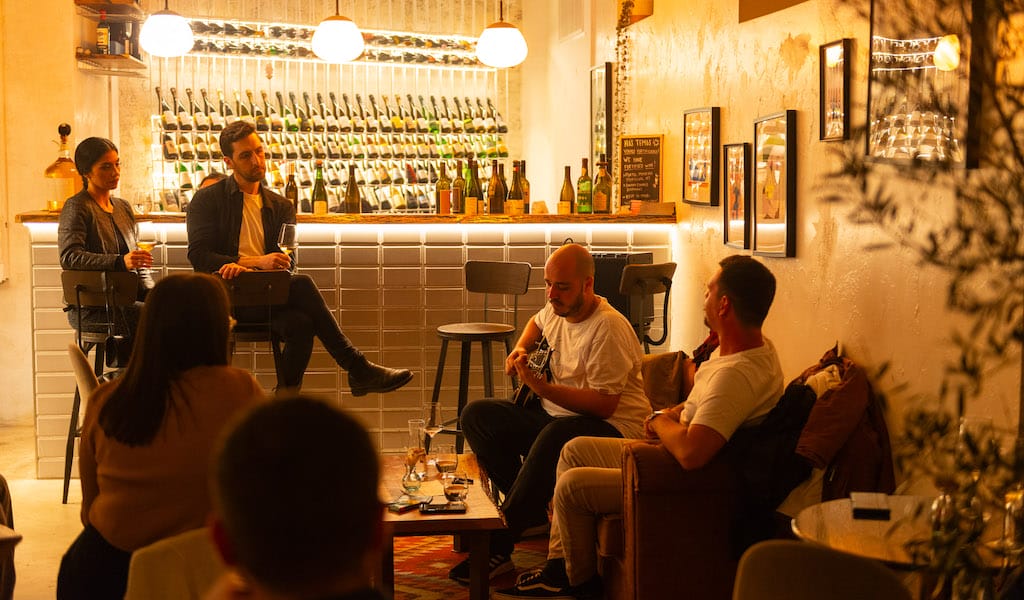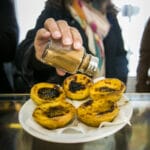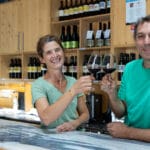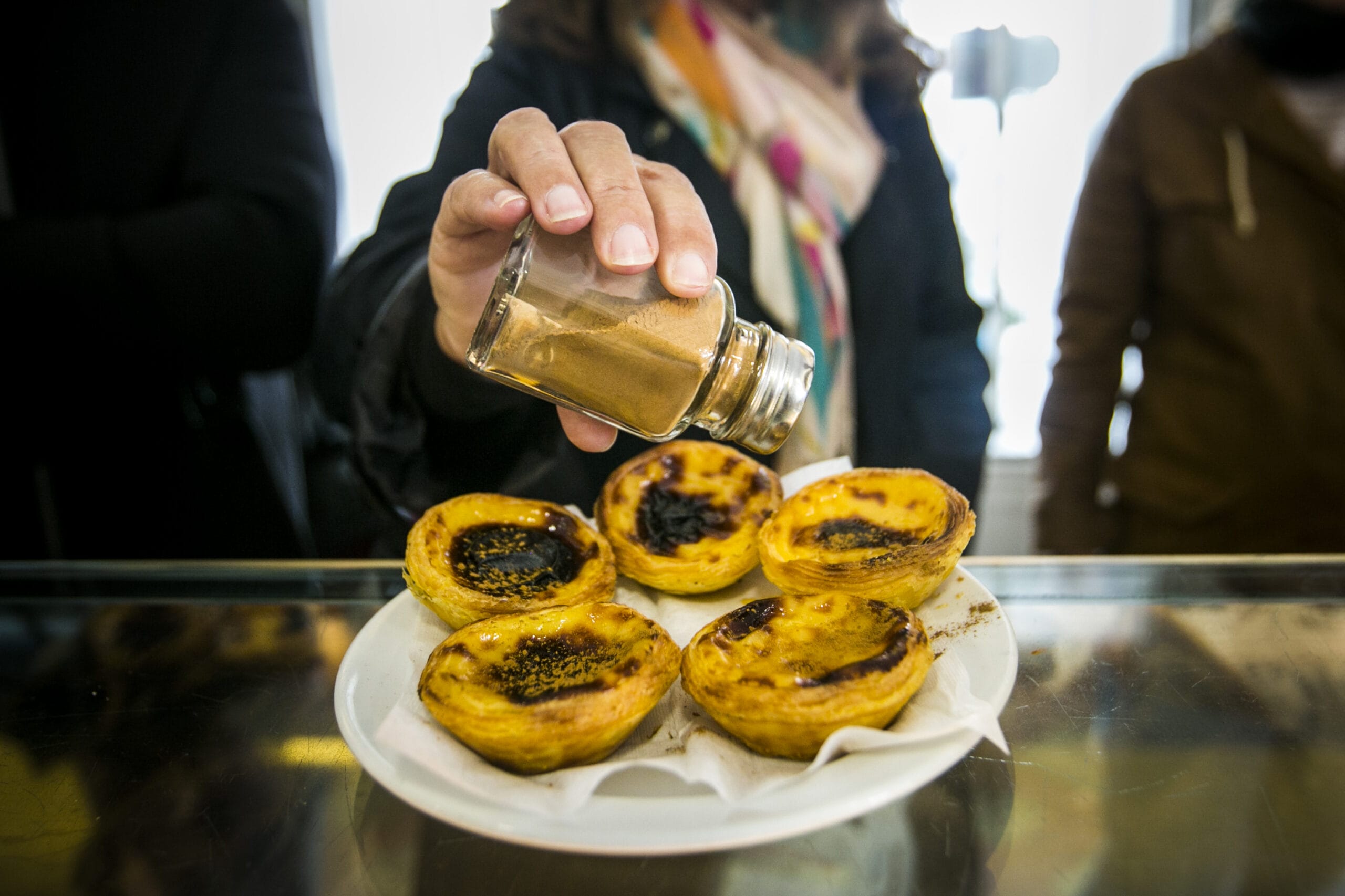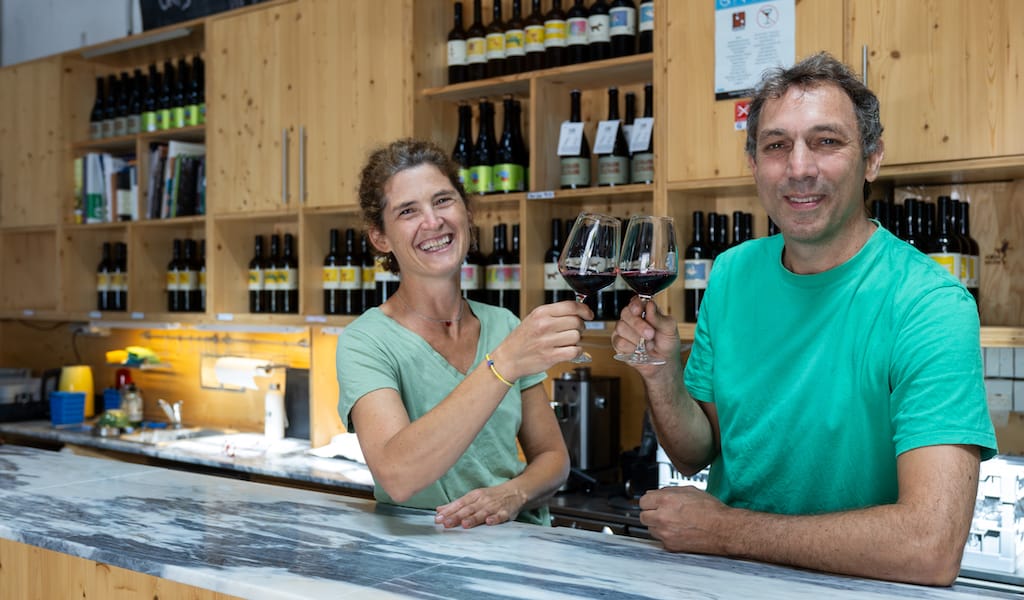It was an unusual night. But Black Sheep is, admittedly, an unusual venue.
Lucas Ferreira, one of the co-owners of the Lisbon wine bar, had pulled out a guitar and was engaging in a jam session with a former bandmate. For a good 45 minutes, the normally buzzy bar was on pause: the chatter had ceased, glasses were not being poured. The only interruption was the occasional bark of an elderly dog that was wandering the space. Customers were singing along, the lights were low, and the vibe was less of a wine bar and more of a private party.

“This is what we do at home,” mentions Lucas, a former musician, when I ask about the impromptu performance. “Maybe it should be a normal thing!”
Lucas and his wife Bruna Ventura are the co-owners of Black Sheep. Originally from Brazil, the couple had a mutual interest in wine, which took them to the U.K., where they enrolled in a wine course and found jobs in the food and beverage industry. In 2019, a sommelier course drew them to Lisbon, where Bruna landed a job at Black Sheep, at the time a tiny wine bar owned by an American. At the end of the pandemic, the owner offered to sell them the bar, and just having completed their formal education in wine, they took the plunge.
“I feel like I found my space in the world,” Bruna says, of her decision to take over the bar and make Portugal her home.

In Brazil, Bruna worked as an actress, a skillset that, seemingly against the odds, finds its way into Black Sheep.
“I miss theater, but I feel like I’m playing a character here all the time,” she tells us of her experience running the bar. “The main thing for me is telling the stories behind the bottle, behind the producer. Sharing is a very important part of the job.”

This desire to share may be Black Sheep’s greatest asset. The staff are some of the best in Lisbon at providing practical, helpful tasting notes and background information on the glasses they pour.
“Every week we sit the staff down and do blind tastings and educate them,” Lucas tells us of his staff, part of the couple’s effort to democratize wine. “Wine needs to be accessible. The industry creates a distance.”

If Black Sheep excels at another thing, it’s sourcing interesting bottles.
“Our superpower is to find things before everyone else,” Lucas tells us. For example, Black Sheep is one of the only places in Lisbon that regularly serves sherry, fortified wines from the south of Spain. There’s typically a bottle of a Portuguese fortified wine open, too – oddly enough, a rarity in Lisbon wine bars – and they also have several bottles of champagne from smaller producers. And although their list plucks from a variety of countries, there is an emphasis on bottles from Portugal.

“[Portugal] is a very small country with so much variety of terroir, grapes, producers,” Lucas tells us, when we ask what’s unique about the country’s wine.
“You can have beautiful, fluid reds in Dão and super deep and complex sparkling wines in Bairrada,” says Bruna, of two of Portugal’s lesser-known wine regions, when we ask her to describe some of her favorite Portuguese wines. “And, of course, you have fortified wines from Porto and Madeira.”
This emphasis on education and storytelling, and a knack for sourcing elusive bottles, made Black Sheep one of Lisbon’s go-to destinations for fans of wine. But approximately the size of a walk-in closet, the tiny bar had its limits. In July of 2023, Lucas and Bruna obtained the lease of the space next door and were able to expand.

The Black Sheep of today is several times larger than that original space. Yet a central dining table, sofas and warm lighting lend the bar a homey, almost living room-like feel. This family vibe extends to the bar’s customers, who, on the evening we visited, included local sommeliers and wine educators, a wine producer, wine importers, and even the owner of a different wine bar – a huge slice of Portugal’s wine community, who all seem to know each other and to see Black Sheep as a meeting point. And the additional space gives the couple the ability to host tastings, wine releases, small conferences on wine and less conventional events such as a recent night that blended live music and wine tasting.
“This is our dream,” says Lucas, still seemingly pumped with adrenaline after his performance. “We wanted to bring people to this space and to do different things.”
We asked Bruna to share three bottles that she feels express the unique characteristics of Portuguese wine:
António Madeira Vinhas Velhas Branco 2021
The tiny, landlocked region of Dão was Bruna’s entry point to Portuguese wines.
“This is the very first producer I really fell in love with because his wines really represent the place where they’re from,” Bruna tells us. “This wine is a trip to the Dão region.”
She tells us that the winemaker, António Madeira, studied in Burgundy and later applied this knowledge in Dão. This white, made from a blend of grapes, expresses a freshness and salinity characteristic of the wines of both regions.
Filipa Pato Nossa Solera Espumante
One of Bruna’s favorite winemaking regions in Portugal is Bairrada, a relatively small, coastal zone that’s known for its sparkling wines.
This bottle is made in Bairrada by Filipa Pato, arguably Portugal’s most famous female winemaker. It’s a non-vintage perpetual reserve meaning that it’s made from a variety of wines that have been saved over the years, to which the traditional sparkling method is applied.
Viúva Gomes Genuíno 2020 Branco
This bottle is made from 100% Malvasia grapes grown on the Atlantic coast west of Sintra, one of the Lisbon area’s nine sub-regions. Colares (also sometimes written as Collares) is unique as its sandy soils protected it from the phylloxera infestation that destroyed nearly all of Europe’s vineyards during the 19th century.
“You can feel the Portuguese sea coast,” says Bruna of this bottle, which is made by a small, family-run winery that’s among her favorite producers.
Austin BushAustin Bush
Published on April 10, 2024
Related stories
April 4, 2024
LisbonQuick Bite: On this food tour in Lisbon, we’ll experience a cultural feast, tasting some of the most diverse bites of the city’s gastronomy and meeting the people behind them. The oldest city in Western Europe, once the hub of a trading empire that connected Macau in the east to Rio de Janeiro in the…
March 13, 2024
LisbonUnlike most capitals, Lisbon has vineyards within its territory, and plenty of vines within reach in neighboring municipalities, from Sintra to Cascais and Loures. But until 2020, there wasn’t a single winery to be found in the city itself. Adega Belém has remedied this. Located right at the edge of one of the city’s most…
August 28, 2023
LisbonYou don’t have to look far to find a glass of wine in Lisbon. But a unique glass of wine – perhaps something made by a small producer, or a bottle from an obscure region – in a comfortable or perhaps even trendy atmosphere, poured by someone who can explain what you’re drinking? That’s where…







































